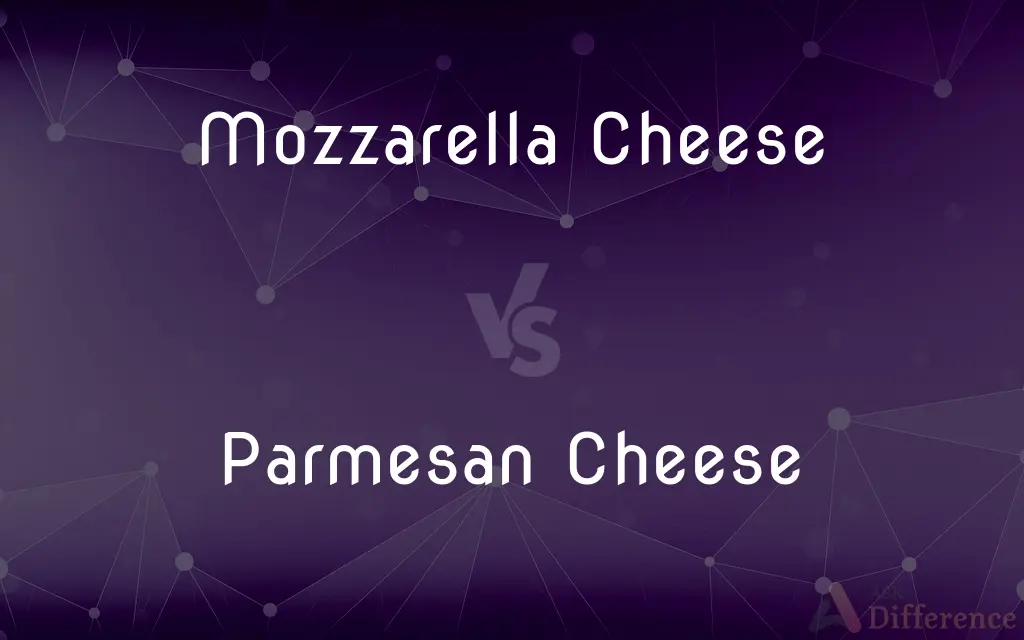Mozzarella Cheese vs. Parmesan Cheese — What's the Difference?
Edited by Tayyaba Rehman — By Fiza Rafique — Published on November 21, 2023
Mozzarella Cheese is a soft, white, stretchy cheese primarily used for pizzas; Parmesan Cheese is a hard, aged, and granular cheese perfect for grating over dishes.

Difference Between Mozzarella Cheese and Parmesan Cheese
Table of Contents
ADVERTISEMENT
Key Differences
Mozzarella Cheese is renowned for its soft, elastic texture, making it a favorite for melting atop dishes, while Parmesan Cheese stands out with its hard, crumbly texture, frequently grated or shaved over foods.
Originating from Italy, Mozzarella Cheese is made primarily from buffalo's or cow's milk. In contrast, Parmesan Cheese, known as "Parmigiano-Reggiano" in its native Italy, is exclusively made from cow's milk and undergoes a longer aging process.
When one thinks of a cheese pull in a pizza slice, it's usually Mozzarella Cheese that comes to mind, given its renowned stretchy characteristic. Parmesan Cheese, on the other hand, doesn't melt in the same way but imparts a rich, umami flavor when sprinkled over pasta, risottos, or salads.
The freshness of Mozzarella Cheese is paramount, often enjoyed best when consumed within a short period after production. Parmesan Cheese stands opposite in this regard, with aging that can range from 12 months to over 36 months, resulting in deep, nutty flavors.
Both cheeses are celebrated components of Italian cuisine, but while Mozzarella Cheese often takes center stage in dishes like pizza or caprese salad, Parmesan Cheese shines as a finishing touch, adding a burst of flavor to a multitude of dishes.
ADVERTISEMENT
Comparison Chart
Texture
Soft and stretchy
Hard and crumbly
Primary Use
Melting atop dishes
Grating or shaving over dishes
Aging
Typically fresh
Aged for months to years
Milk Source
Buffalo's or cow's milk
Exclusively cow's milk
Typical Dishes
Pizzas, lasagnas, caprese salads
Pastas, risottos, Caesar salads
Compare with Definitions
Mozzarella Cheese
Mozzarella Cheese is known for its elasticity when melted.
The Mozzarella Cheese stretched as she pulled apart her grilled cheese sandwich.
Parmesan Cheese
Parmesan Cheese is a hard, aged Italian cheese.
She grated Parmesan Cheese over her spaghetti.
Mozzarella Cheese
Mozzarella Cheese often comes in white, moist balls.
She placed a slice of Mozzarella Cheese on each tomato for her caprese salad.
Parmesan Cheese
Parmesan Cheese undergoes a lengthy aging process.
The 24-month aged Parmesan Cheese was her favorite due to its intense flavor.
Mozzarella Cheese
Mozzarella Cheese is a staple in many pizza recipes.
Without Mozzarella Cheese, her homemade pizza just wouldn't be the same.
Parmesan Cheese
Parmesan Cheese is often used as a topping for its granular texture.
A light sprinkle of Parmesan Cheese added the perfect touch to the Caesar salad.
Mozzarella Cheese
Mozzarella Cheese is a soft-textured Italian cheese.
I love the way Mozzarella Cheese melts on pizza.
Parmesan Cheese
Parmesan Cheese has a rich, nutty flavor.
The depth of Parmesan Cheese's flavor enhanced the risotto.
Mozzarella Cheese
Mozzarella Cheese can be made from buffalo's or cow's milk.
She preferred buffalo Mozzarella Cheese for its richer taste.
Parmesan Cheese
Parmesan Cheese is known as "Parmigiano-Reggiano" in Italy.
When in Italy, she made sure to buy authentic Parmigiano-Reggiano or Parmesan Chees
Common Curiosities
Is Parmesan Cheese soft like Mozzarella Cheese?
No, Parmesan Cheese is hard and crumbly, unlike the soft texture of Mozzarella Cheese.
Are both cheeses from Italy?
Yes, both Mozzarella Cheese and Parmesan Cheese have origins in Italy.
Can Mozzarella Cheese be aged like Parmesan Cheese?
Typically, Mozzarella Cheese is enjoyed fresh, whereas Parmesan Cheese is aged for months to years.
Is there a difference between "Parmigiano-Reggiano" and Parmesan Cheese?
"Parmigiano-Reggiano" is the authentic name for Parmesan Cheese produced in specific regions of Italy, meeting particular standards.
How long is Parmesan Cheese aged?
Parmesan Cheese can be aged for anywhere from 12 months to over 36 months, depending on the desired flavor intensity.
What gives Mozzarella Cheese its stretchy quality?
The protein structure and moisture content in Mozzarella Cheese contribute to its stretchy quality when melted.
Is it true that there's buffalo Mozzarella Cheese?
Yes, there's a variety of Mozzarella Cheese made from buffalo's milk, known for its richer taste.
Which cheese is more suitable for grating over pasta?
Parmesan Cheese is ideal for grating over pasta due to its hard texture and rich flavor.
Why is Parmesan Cheese so flavorful?
The lengthy aging process of Parmesan Cheese intensifies its flavors, giving it a distinct, nutty taste.
What is Mozzarella Cheese primarily used for?
Mozzarella Cheese is mainly used for pizzas and melting atop various dishes.
How should I store Mozzarella Cheese?
Mozzarella Cheese should be stored in the refrigerator, preferably in its brine or wrapped to retain moisture.
Can you use Parmesan Cheese for pizza?
While Mozzarella Cheese is the preferred choice for pizzas, Parmesan Cheese can be used as an additional topping for flavor.
Is Mozzarella Cheese lower in fat than other cheeses?
Mozzarella Cheese, especially the part-skim variety, can be lower in fat compared to many aged cheeses.
Can I eat the rind of Parmesan Cheese?
While the rind of Parmesan Cheese is edible, it's often tough and used to flavor soups or broths instead of direct consumption.
Share Your Discovery

Previous Comparison
Dip vs. Splash
Next Comparison
Cane Corso vs. PitbullAuthor Spotlight
Written by
Fiza RafiqueFiza Rafique is a skilled content writer at AskDifference.com, where she meticulously refines and enhances written pieces. Drawing from her vast editorial expertise, Fiza ensures clarity, accuracy, and precision in every article. Passionate about language, she continually seeks to elevate the quality of content for readers worldwide.
Edited by
Tayyaba RehmanTayyaba Rehman is a distinguished writer, currently serving as a primary contributor to askdifference.com. As a researcher in semantics and etymology, Tayyaba's passion for the complexity of languages and their distinctions has found a perfect home on the platform. Tayyaba delves into the intricacies of language, distinguishing between commonly confused words and phrases, thereby providing clarity for readers worldwide.
















































